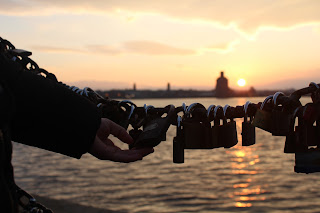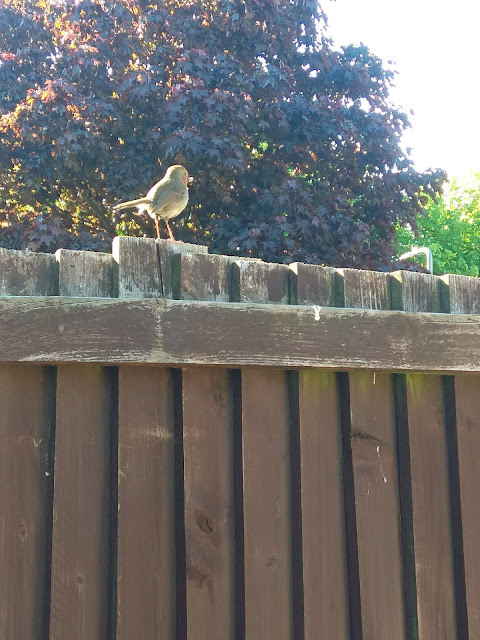Invisible Connections
I’ve
always found it interesting how human nature skirts around logic sometimes,
simply striding past without so much as a glance at it – like the motes of dust
that swirl around us, that we brush off our cheeks and inhale into our bodies,
invisible to us except when a stray ray of light falls across them at an angle,
and suddenly there they are, slow, hypnotic, afloat, little specks of dust.
Maybe
it’s not logic- maybe the idea I’m looking for is empathy. I don’t think empathy is as innate in humans
as we would hope it to be. Which is why
women who internally rage at their husbands for never pitching in with the
housework always ask their daughters or daughters in law – never their sons - to
bring the forgotten water bottle from the kitchen; which is why when we’re
crossing the road and a car honks at us, we shake our fists at them and think ‘people
in cars are such schmucks’ and when we’re the ones in the car and somebody takes
too long to move from one end of the road to the other or suddenly darts across
(after having waited 25 minutes for a car to pause for just 15 seconds), we
think ‘stupid pedestrians!’; which is why when we’re the boss, we always glance
notably at our watches when employees come in late, and when our boss tosses that disapproving look
at us for being late, we grit out teeth and think: it’s just four minutes!
To be
in someone else’s shoes we first have to pause long enough to take ours off and
reach for theirs, and then too, put them on, wiggle our toes for a bit and
pause again, long enough to think, oh, that’s
how it feels. Ain’t nobody got time
for that, especially if my smart phone still has enough battery for me to
browse pretty pictures of beaches and artificially arranged dry flowers around
hardback books and coffee cups that never go cold.
When
we were studying about privilege and oppression during my Master’s, I was
intrigued how people can be oppressed in one category (say gender, for example)
and continue to oppress people of another category. In other words, a woman who knows firsthand
what it feels to be shut up by men all the time, to be paid less for the same
job or expected to give up the last cupcake on the plate for her husband or her
son, will not bat an eye while glancing at another woman wearing a burqa and
saying, “I don’t understand why she wants to spend so much money on buying
clothes that she’s just going to hide under a giant black gown”.
It’s
the same principle, really, when a person of color exasperated by the salesgirl
following her every move in a jewelry store storms out of the shop, and then flips
her hair and rolls her eyes at a gay couple holding hands by the pretzel kiosk.
The
same line of thought that we don’t pick up on when we bristle at the news story
of armed Americans protesting the building of a mosque somewhere in Texas but
nod along to the Friday sermon that brands the Shia community as evil or the
Ahmaddis as non-Muslims.
I
always thought that we would be able to empathize better, that we would see the
connections shimmering like so many silver threads all around us and tug on
them, letting each other know, hey, I get it, it sucks when people do that to
me so I will never, ever do that to you.
But of
course, it doesn’t work that way. For
some reason, God decided that logic and empathy, love and tolerance, understanding
and support, won’t come to us like gravity does, and in the process, made
everything so difficult.
I’m
vary of making generalizations, so I’ll only talk about what I’ve had
experience of, namely the Pakistani Muslim communities that I have spent my
life in and with. Hypocrisy is the snake
that slithers in all our gardens, hiding beneath overgrown weeds and general frustrations
like potholed roads, gas shortage, bad traffic and humidity, and the more
worrying insidious news stories of bombs and explosions and deaths that don’t piece
our hearts that sharply anymore because we’ve almost bled out by now, but they
quietly slip into our minds, adding to the weight on our souls and shoulders.
It
hurts me to say it but there is a stringent lack of tolerance and empathy in
our society. We shout for rights that we
rip out of other people’s hands. From the
lower end of the spectrum, where we complain about the unruly traffic but break
the light when we want, to the more terrifying end where we want fair immigration
policies in the US, the UK and European Union while not even glancing at our
own country’s treatment of immigrants and refugees, where we want our religious
freedoms safeguarded hundreds and thousands of miles across the ocean in a
country that we left our own for just because we wanted more, but God forbid we
talk of secularism in Pakistan that might pave the way for a more tolerant
society (without ridding you (and me) of your (and my) right to pray and
practice Islam, seriously, secularism is not a war on religion, please, jeez, Louise,
would you get a grip and stop jumping a mile into the air at the mere enunciation
of words.)
We don’t
like being subjected to the carefully organized ‘random’ checks at airports,
and the double glances or scowls received on buses or in shops on our trips
abroad, but we don’t even notice racial slurs and thoughts that form part of
our everyday conversations.
One
of the reasons why it’s easy for us to hate, or at the very least not care
about, other communities is simply because we’ve never spent time with
them. Who knew one of the easiest ways
to care is share a class or a joke or a piece of gum with someone?
Another
one of God’s little tricks is our tendency to stick to things and people we
know, especially when in a new or unfamiliar territory. Which is why we see groups of Asian teenagers
hanging out or entire neighborhoods of desi families living together; which is why when we attend a college reunion
or an office party, we immediately look for a familiar face and then beeline
for people we already know and like. The
downside to this is that we end up reliving our lives and missing the
opportunity to learn about new people, how they live, their talents and their
fears, their secrets and their burdens.
I don’t
think our elders did it consciously, but when they told us to make the ‘right
friends’ and choose ‘good people’ to hang out with, they automatically assumed
that the good ones were those who were similar – from sharing the same sex to
the same religion, from the same race and ethnicity to the same socio-economic
background.
It’s
easier to exist in your homogenous bubble in a country like Pakistan, where the
majority is Sunni Muslim (Wikipedia says between 75-95%) and there is
relatively less diversity (say compared to places like Nottingham where I am
now, or even St. Louis, let alone cities like New York and London), where people
exist in silos and with the exception of larger cities like Karachi and Lahore,
you can go for days without meeting people from different backgrounds.
It is
incredibly important for us to burst this bubble and step out. It might hurt our egos and it might challenge
our faith, it might be harder to convince ourselves of the absolute rightness
of our beliefs and way of life when we sit next to people who are wildly
different in their ideas and practices and realize they’re good mothers and
fathers, hardworking doctors, talented artists and caring neighbors, that they
also love doing barbecues with their families and arranging yellow tulips on
their kitchen windows, that they also worry about their aging mother’s health
and their son’s Math results, that they like their apple pie without ice cream
but definitely need a spoon of sugar in their tea too.
It’s
when we break our invisible barriers and remember that we carry the keys to our
shackles in our own pockets and unlock ourselves, that we realize how much in
common we have with people we thought are so foreign and different and unworthy
of our thoughts and support. That the
labels we’ve pasted on their foreheads are as rude and unfair as the ones they’ve
stuck to our backs, that our mutters about their way of dressing and sleeping
and eating are as hurtful as theirs about our decisions and prohibitions.
I
watched a really good documentary called 13th, and it made me
realize how our (and by our I mean the Muslim community in general and the Pakistani
Muslim community in particular) feathers are so ruffled by the current political
climate in America, while we feel it is so easy to ignore the injustice that
has been going on against other communities of color in the US for so many
years.
I
think there is a general lack of empathy in our community for causes we don’t realize
are similar to our own, and a more damaging hypocrisy that makes us blind to
our own prejudices.
I’ve
never been the one to nag people about changing their statuses to remember deaths
in Syria if they did so about deaths in France – we need to do so much more
about our own thoughts and actions than keep count of what other people say on
social media. But I do think when
something terrible is going on in our own backyards then we should at least
acknowledge it before picking up the binoculars to look across the border and
point fingers at others for their wrongs.
And I
encourage you to broaden your horizons – to travel to other countries and take
the time to talk to people you’ve condemned to hell, to watch documentaries on
civil rights movements across the world, watch films about difficulties that
people of different income groups, races, religions and sexualities go through,
to read articles about perspectives other than your own, to challenge yourself,
to shake ideas and perceptions that you think are made of pure gold but are
actually socially constructed, and to glance down and spot the sun rays light
up the countless invisible threads that bind us all together.



Comments
Post a Comment